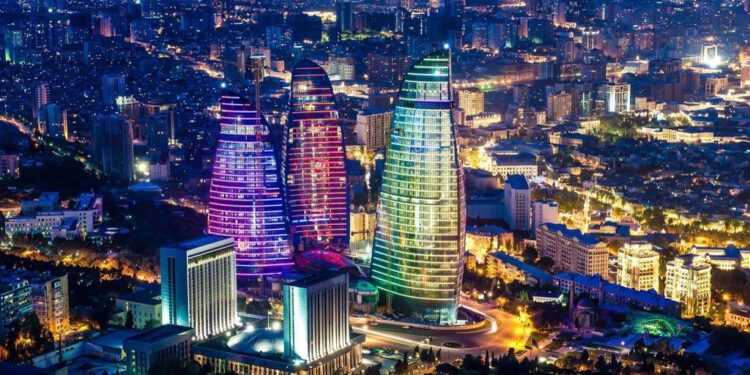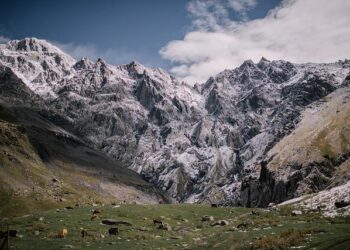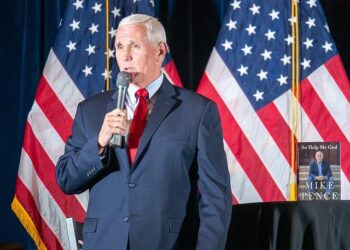As Syria navigates the turbulent aftermath of a decade-long conflict, new regional players are stepping onto the stage to shape the country’s future. Among them, Azerbaijan is emerging as a noteworthy actor, leveraging its strategic interests and diplomatic initiatives to carve out a distinct role in post-Assad Syria. This development signals a shift in the complex geopolitical landscape of the Middle East, as explored in a recent analysis by the Stimson Center.
Azerbaijan’s Strategic Interests in Post-Assad Syria Unveiled
Azerbaijan’s recalibrated foreign policy in Syria reflects a nuanced strategy to extend its geopolitical influence beyond the South Caucasus. As Damascus seeks to reconstruct and reassert its sovereignty following years of conflict, Baku has positioned itself as a pivotal economic and diplomatic player. This approach hinges on deepening bilateral ties through energy cooperation, infrastructure projects, and security dialogues, aimed at fostering a mutually beneficial partnership. Azerbaijan’s leveraging of its growing regional clout and energy export expertise directly aligns with Syria’s urgent reconstruction needs, carving a niche in a landscape historically dominated by Russia and Iran.
- Energy Corridor Expansion: Azerbaijan aims to facilitate new transit routes encompassing Syrian markets.
- Investment Opportunities: Targeted sectors include telecommunications, agriculture, and transport infrastructure.
- Counterterrorism Collaboration: Enhancing intelligence sharing and stabilizing border security zones.
This multidimensional engagement signals Baku’s intent to challenge traditional alliances and secure its strategic interests amid Syria’s evolving power dynamics. Notably, Azerbaijan’s emphasis on economic diplomacy seeks to complement the post-conflict order, contributing to Syria’s stabilization while ensuring sustained access to emerging trade corridors. The juxtaposition of energy diplomacy with security cooperation outlines a comprehensive blueprint that may recalibrate regional alignments.
| Aspect | Azerbaijan’s Focus | Syria’s Benefit |
|---|---|---|
| Economic | Energy export routes, Infrastructure investment | Reconstruction funding, Market diversification |
| Political | Diplomatic alliances, Regional influence | International support, Strategic partnerships |
| Security | Counterterrorism measures, Intelligence exchange | Border stabilization, Reduced militancy |
Economic and Security Opportunities Driving Baku’s Regional Engagement
Baku’s strategic initiatives in the region are increasingly shaped by intertwined economic ambitions and security considerations. As Azerbaijan seeks to expand its footprint beyond the South Caucasus, it leverages its geographic position and energy assets to foster deeper ties with neighboring states, including the evolving landscape of post-Assad Syria. Investments in infrastructure projects such as transport corridors and energy cooperation offer mutually beneficial economic opportunities, while simultaneously enhancing Azerbaijan’s influence as a pivotal regional actor.
On the security front, Azerbaijan’s engagement is driven by shared interests in combating terrorism and stabilizing conflict zones that directly impact regional peace. This has led to a multifaceted approach involving:
- Intelligence-sharing frameworks aimed at countering extremist threats
- Joint training exercises with regional partners to improve border security
- Diplomatic initiatives promoting dialogue between diverse actors in the Syrian context
| Opportunity | Benefit to Azerbaijan | Regional Impact |
|---|---|---|
| Energy Transit Routes | Increased transit fees and strategic leverage | Enhanced connectivity and market integration |
| Security Partnerships | Improved counterterrorism capabilities | Greater stability along critical borders |
| Infrastructure Development | Economic diversification and job creation | Post-conflict reconstruction support |
Policy Recommendations for Strengthening Azerbaijan-Syria Cooperation
To enhance bilateral collaboration, it is crucial for both nations to prioritize robust diplomatic engagement, fostering dialogue that addresses mutual interests such as regional security, economic development, and infrastructure rebuilding. Encouraging joint participation in multilateral forums will amplify their voice on shared concerns while establishing trust through transparent communication channels. Additionally, Azerbaijan and Syria should explore opportunities for collaboration on energy projects and trade facilitation to revive economic ties that have been dormant due to years of conflict.
A strategic framework for cooperation could consider the following key initiatives:
- Joint investment funds targeting post-conflict reconstruction and technology transfer.
- Security partnerships focusing on counterterrorism and border control measures.
- Cultural and educational exchanges aimed at building goodwill and youth engagement.
- Infrastructure rehabilitation programs leveraging Azerbaijan’s expertise in transport and energy sectors.
| Priority Area | Proposed Initiative | Expected Outcome |
|---|---|---|
| Economic Cooperation | Establishment of trade corridors | Increased bilateral trade volume |
| Security Collaboration | Joint counterterrorism exercises | Enhanced regional stability |
C It looks like the content provided cuts off at the third table row, mid-entry. Would you like me to help complete the table based on the themes in your text? For example, continuing with entries for Cultural and Educational Exchanges and Infrastructure Rehabilitation, along with their proposed initiatives and expected outcomes? Let me know how you’d like to proceed!Insights and ConclusionsAs Azerbaijan deepens its engagement in post-Assad Syria, its growing diplomatic and economic ties signal a strategic pivot with broader regional implications. While challenges remain in navigating the complex Syrian landscape, Baku’s emerging role underscores a shift in Middle Eastern dynamics that merits close attention. As developments continue to unfold, Azerbaijan’s actions will likely influence not only Syria’s reconstruction trajectory but also the geopolitical balance across the region. ADVERTISEMENT |
















